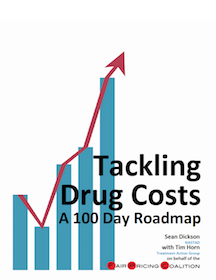December 7, 2016 – The Fair Pricing Coalition announces the release of “Tackling Drug Costs: A 100-Day Roadmap,” an analysis of existing federal statutes and regulations that should be strengthened to dramatically lower the prices of drugs and biologics in the U.S. The report, distributed to the President-elect’s transition team and Congressional leaders, provides a roadmap that can be implemented quickly on the heels of growing bipartisan support for feasible measures to control the skyrocketing costs of prescription medications.
Executive Summary (293 KB)
Full Report (906 KB)
Model Legislation (304 KB)
Infographics (736 KB)
“The American drug pricing system is in disrepair,” said FPC member Sean Dickson, lead author of the report and Senior Manager, Health Systems Integration, at NASTAD (National Alliance of State and Territorial AIDS Directors) in Washington, DC. “Political inertia and existing statutory penalties are failing to stop exorbitant drug prices. Significant restructuring of payer systems is certainly one approach. However, our analysis clearly indicates that the incoming Administration and Congress can readily strengthen and modernize the existing framework to reduce federal drug spending and discourage egregious price increases in the private market.”
Cost control regulations and statutes already exist. Federal legislation, however, has not maintained pace with drug manufacturers’ tactics to circumvent these measures. The report highlights four pathways to promptly modernize and strengthen existing regulations and statutes to control drug costs, drawing on existing authority and concrete legislative actions:
- Fix the Formulas: Modernize and strengthen current ceiling price formulas to ensure that government payers are not paying more than commercial payers;
- Enhance Existing Penalties: Remove inflation penalty caps, increase penalties on drugs with the most egregious price hikes, and apply penalties to new drugs with launch prices far in excess of top sellers in the same class;
- Pool Purchasing Power: Increase inter- and intra-agency collaboration to consolidate Federal and State negotiating power; and
- Pull Back the Curtain: Buttress existing transparency tools while studying the effects of additional manufacturer price and payer cost disclosures.
“FPC has spent many years pleading with the pharmaceutical industry, particularly those responsible for manufacturing lifesaving human immunodeficiency virus (HIV) and hepatitis C virus (HCV) drugs and biologics to keep their prices in check as to not create hugely problematic access barriers,” explained FPC Co-Chair Tim Horn, co-author of the report and the Deputy Executive Director, HIV & HCV Programs, at Treatment Action Group (TAG) in New York. “Pharma clearly isn’t listening and it appears to be doubling down on messaging and lobbying efforts to justify its egregious pricing.
“It is high time for the government to clamp down on drug pricing tactics that drive up health care costs and invariably hurt health care consumers,” Horn said. “Bipartisan Congressional support for cost restraints has grown and President-elect Trump, who has voiced support for a more proactive role of government in drug pricing, must forcefully confront one of the most significant barriers to lifesaving treatment in the U.S.”
“Manufacturers continue to price prescription drugs and biologics beyond what the U.S. market and healthcare consumers can reasonably bear,” said FPC Co-Chair Emalie Huriaux, who is also Director of State and Federal Affairs at Project Inform in San Francisco. “For people living with HCV, in particular, significant challenges accessing curative treatment have become commonplace, particularly among those accessing care through federal or state programs. Enough is enough. With this roadmap to quickly control drug costs without jeopardizing market-driven ingenuity, along with other emerging proposals for sweeping reforms to rein in domestic and global drug spending, we hope that the Administration and 115th Congress will prioritize swift and meaningful action against runaway drug pricing.”

